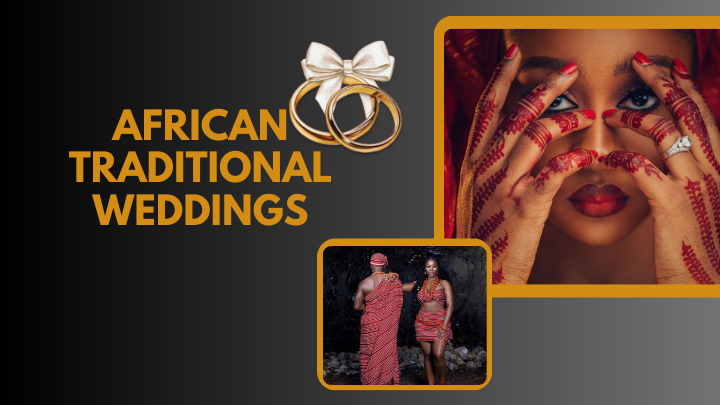African traditional weddings
Weddings in Africa are much more than a union between two individuals; they are a vibrant celebration of culture, community, and tradition. With over 3,000 ethnic groups spread across the continent, African weddings are as diverse as the countries and regions they come from. Each culture has its own set of rituals, attire, and symbolism that make these celebrations unique. While traditional African weddings remain cherished in their respective communities, many have evolved to reflect modern influences, particularly among African diaspora communities in countries like Australia.
This article delves into the beautiful and meaningful aspects of African traditional weddings, exploring key customs, the significance of attire, and how these rituals have adapted in the context of Australia.
1. The Importance of Family and Community
In many African cultures, marriage is not just about the couple, but also about the coming together of families and communities. Traditionally, African weddings are communal affairs where extended family members, friends, and even neighbors come together to celebrate the union. The event is seen as a way to strengthen ties within the community and honor ancestral heritage.
Bride Price (Lobola/ Mabogo): A common practice in many African cultures is the payment of bride price, known as lobola in Zulu culture or mabogo in other regions. This symbolic gesture is a way for the groom and his family to demonstrate their respect for the bride and her family, and it signifies the value placed on the bride as an individual and as a member of her family. The bride price may involve monetary payment or a combination of money and goods such as cattle, land, or other items of value.
This practice varies from culture to culture, with some places offering symbolic amounts, while others see it as a significant financial commitment. In contemporary African weddings in Australia, the bride price may be modified to suit the new context but remains an important element in connecting the couple to their cultural roots.
2. Customs and Rituals: A Rich Tapestry of Traditions
African weddings are rich with diverse rituals that symbolize the beginning of a new life together, but the specific traditions depend largely on the ethnic group. Here are some notable customs that are observed in various cultures across Africa:
- The Hand Binding Ceremony: In some West African cultures, couples may participate in a hand-binding ceremony, where the bride and groom’s hands are tied together with cloth to symbolize their unity and commitment to each other. This tradition signifies the couple’s bond and their shared responsibility in marriage.
- The Dotting of the Bride: Among the Yoruba people of Nigeria, the bride’s face may be adorned with beautiful markings known as "eko." This ritual symbolizes beauty, fertility, and the bride's transition into womanhood. In some weddings, it is a representation of respect for the bride’s family and cultural lineage.
- The Traditional Dance: Music and dance play a central role in African weddings. Traditional dances, such as the Adumu (Maasai jumping dance) or the Isicathamiya (Zulu style), showcase the joy of the celebration and are often performed by the bride, groom, and their guests. The couple’s first dance is an emotional moment, often accompanied by powerful drumming and singing.
- The Blessing of the Couple: Elders or spiritual leaders are often invited to offer blessings to the newlyweds. This may involve prayers for fertility, happiness, and prosperity, as well as advice about the responsibilities of marriage.
While these customs vary across African cultures, they all share a common theme of unity, respect, and celebration of family and community.
3. Wedding Attire: Symbolism in Every Stitch
The attire worn by the bride and groom is one of the most symbolic elements of an African traditional wedding. These garments are often vibrant and colorful, reflecting the rich heritage and artistic craftsmanship of the couple’s cultural background. Here are a few examples of traditional wedding attire:
- The African Bridal Gown: While Western-style white wedding dresses have gained popularity, many African brides opt for traditional attire that features intricate beadwork, embroidery, and bold, bright fabrics such as ankara (a printed cotton fabric popular in West Africa) or kente cloth (a brightly colored silk fabric from Ghana). In some cultures, the bride may wear a headscarf or veil that signifies modesty.
- The Groom’s Attire: Grooms often wear a dashiki (a loose-fitting tunic with African prints) or agbada (a flowing robe with embroidered designs, common in Nigerian weddings). The groom’s attire is typically paired with accessories such as a fez or cap, symbolizing dignity and respect.
- Beads and Jewelry: In many African cultures, jewelry is a vital part of the wedding attire. For instance, in the Swahili culture, women often wear elaborate beaded necklaces that symbolize beauty and femininity. In some cultures, the bride may also wear anklets, bracelets, and earrings that signify her social status and importance.
In Australia, many African couples incorporate traditional attire into their weddings, blending both African and Western elements. Brides may wear a Western-style gown for the ceremony, then change into a traditional African dress for the reception, or vice versa. This blend of cultures allows African couples to honor both their heritage and their new Australian identity.
4. Modern Adaptations in Australia
As African diaspora communities have grown in Australia, many African couples have adapted traditional wedding practices to fit their new context. The melding of African traditions with Australian customs has led to creative and unique wedding ceremonies that celebrate both cultures.
- Hybrid Weddings: Couples often combine African and Australian wedding elements, such as holding the ceremony in a church (common in many African communities) and then incorporating African music, dances, and rituals during the reception. These hybrid weddings allow couples to honor their African heritage while embracing the multicultural nature of Australian society.
- Community Involvement: The importance of family and community is still central to African weddings in Australia. Many African couples involve their extended family members and friends in the planning and execution of the ceremony. Weddings may be held in community halls, cultural centers, or outdoor venues, where guests can come together to celebrate the couple’s union.
- Cultural Fusion in Food and Music: Food is a central part of African weddings, and Australian-African weddings often feature a fusion of African and Australian cuisine. From traditional dishes like jollof rice and injera to more familiar Australian fare like seafood platters, the meal becomes an expression of both cultures. Similarly, the music may include both African beats and Australian pop tunes to keep everyone dancing.
5. The Enduring Meaning of African Weddings
At their core, African traditional weddings are about the celebration of love, family, and community. The rituals and customs carry deep meaning, reflecting the values of respect, unity, and continuity of life. Whether in Africa or Australia, these weddings remind us of the importance of cultural heritage, the strength of family bonds, and the power of love to transcend borders.
African traditional weddings are a vibrant and meaningful reflection of the continent’s cultural diversity. The customs, attire, and rituals associated with these weddings have been passed down through generations and continue to evolve as African communities adapt to their new lives in countries like Australia. Whether you're attending an African wedding in Australia or simply learning about the traditions, there’s no denying the beauty, symbolism, and rich heritage that these celebrations bring.



